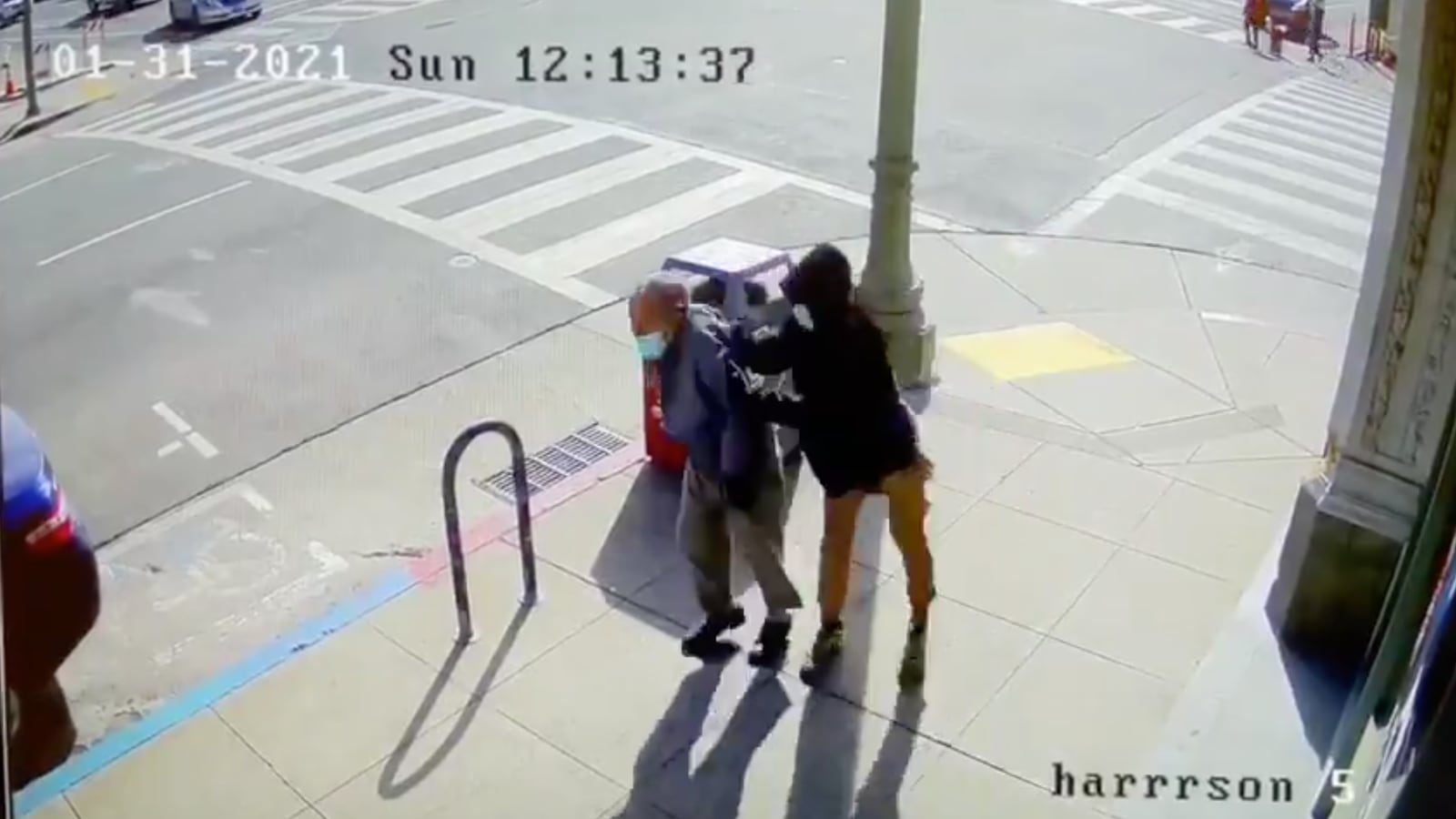A 91-year-old man shoved to the ground. A 71-year old woman attacked and robbed. An 84-year-old man who died after being assaulted on his morning walk.
As the Lunar New Year begins Friday, Asian Americans in the San Francisco Bay Area are afraid to leave their homes, not just because of the coronavirus, but because of a spate of high-profile attacks against elders in recent months.
On Tuesday, Nancy O’Malley, the district attorney of Alameda County, which includes Oakland, said she would be establishing a Special Response Unit to investigate anti-Asian crimes.
“We will help victims heal from their trauma and help the businesses be strong again, here in Chinatown. We will all be vigilant in protecting the Asian community,” O’Malley said at a press conference in Oakland.
Yet others say it’s indicative of historic neglect from officials in investing in their communities, a disparity exacerbated by the coronavirus pandemic—and by politicians like former President Donald Trump using racist language like “China virus” or “kung flu.”
Cynthia Choi, co-founder of Stop AAPI Hate, a group tracking racism against Asian Americans and Pacific Islanders since the start of the pandemic, has spoken to residents too scared to go outside. She said her group had received complaints about 2,800 racist incidents nationwide since last March, with about 700 in the nine counties in the San Francisco Bay Area.
The death of Vicha Ratanapakdee, the 84-year-old man, was perhaps the most shocking. Surveillance footage from Jan. 28 shows Ratanapakdee walking through San Francisco’s Anza Vista neighborhood when someone charges him, shoving him full-force to the sidewalk.
Ratanapakdee, a Thai immigrant, hit his head on the pavement. He succumbed to his injuries days later. Police arrested Antoine Watson, 19, in connection with the attack, charging him with murder and elder abuse.
Annie Esposito, the assistant district attorney of Alameda County tasked with leading the Special Response Unit, stressed that while their ultimate goal was prosecution, their office had additional resources for the community that may be unknown due to the language barrier.
“What we’ve found in these crimes that target elderly Asian Americans is that they are very reluctant to call the police,” Esposito said. “They're reluctant to report the crimes, and they're sometimes reluctant to proceed with the prosecution. And part of it is, we want to help them understand what this process entails.”
She added that one such resource was a Family Justice Center, designed to help connect crime victims with counselors and therapists, as well as law enforcement.
Esposito, who is Asian American, said she’d experienced prejudice first-hand over the summer. She was walking her dog, she said, when she passed by another woman doing the same.
“But then that woman had a very violent reaction to it and yanked the dog back with her leash, and started cussing and swearing,” Esposito said. “And she says, ‘What the f--- did I tell you about those people?’”
“With this attention,” she added, “I'm hoping there will be more resources to the community, to also raise awareness that there are these perpetrators out there who may target vulnerable people.”
On Tuesday, police in Oakland charged Yahya Muslim, 28, with assault, battery, and elder abuse in connection with the attack on the 91-year-old man, along with two separate attacks against a 60-year-old man and 55-year-old woman, according to BuzzFeed News. Esposito said her office was still investigating whether to charge Muslim with a hate crime.
However, Muslim was already in police custody on unrelated charges, according to BuzzFeed. And, that same day, news broke of two more anti-Asian attacks: a slur painted on the side of a Chinese school building in San Francisco, an Asian man in Alameda County’s San Leandro robbed as he tried to deposit money.
“We have to address the fact that people are turning to crime as a way to live,” said Choi, who is also the co-director of Chinese for Affirmative Action, a civil rights group based in San Francisco. “For us, that’s using base kinds of intervention and prevention programs, jobs, programs, addressing affordable housing.”
Loren Taylor, an Oakland city councilman and co-chair of the city’s Reimagining Public Safety Task Force—founded last summer amid a nationwide reckoning with racism in policing, with the ultimate goal of slashing the city’s police budget by half—said the recent violence had brought a newfound interest in justice among residents.
“When I look at my residents in East Oakland, my residents were never the ones that were saying, take away the police,” he said. “What they were saying is that the system is broken, and we need to bring more resources to keeping us safe.”
“It's important that we center those who are most impacted by the violence and the levels of crime that challenge our safety,” he added.
But Vivian Huang, the campaign and organizing director for Asian Pacific Environmental Network—an environmental justice group that specializes in working with immigrant communities—stressed that a solution would have to address violence at its root.
“Safety is about having dignity, having connection with others, understanding each other's needs, having access to resources,” Huang said. “Chinatown, like other communities of color, has a long history of disinvestment. And I think that pandemic has illustrated a really stark example of the immense disparities in our society.”







